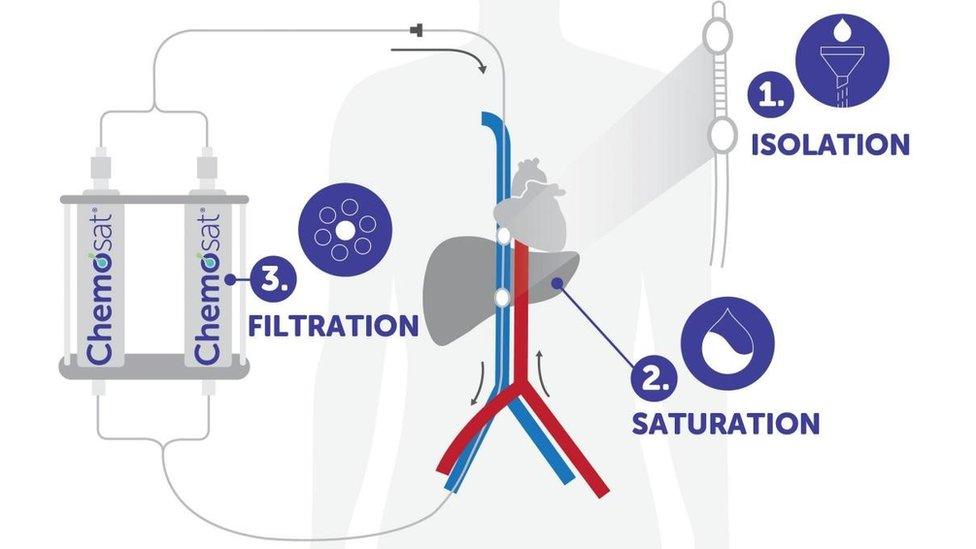Southampton Hospital leads way in new treatment for liver cancer
- Published

Chemosaturation, how the process works and "bathes" the liver, isolating it from other healthy tissue
A new treatment for a type of liver cancer that "bathes" the organ in chemotherapy has proved to be effective in almost 90% of patients.
The procedure, being pioneered at University Hospital Southampton, uses two small balloons to divert blood past the liver while delivering drugs directly into the organ.
So far 100 patients, whose cancer had spread to the liver, have been treated.
Dr Brian Stedman described the results as a "landmark moment" in cancer care.
The technique, called chemosaturation therapy, allows doctors to treat patients with much larger doses than usual because it does not enter the bloodstream and damage otherwise healthy parts of the body.

Southampton General Hospital, where 100 patients have received the pioneering treatment
Once the drug has been delivered, blood from the liver is drained and "cleaned" through a machine before being returned to the patient.
Dr Stedman, a consultant radiologist, said his team had performed 300 procedures in 100 patients whose form of eye cancer known as ocular melanoma had spread to the liver.
In a study published in the journal Melanoma Research, the team found liver cancers were controlled in 88.9% of patients who received chemosaturation therapy, with 62% surviving for a year and 30% after two years.
Dr Stedman, co-founder of Planets cancer charity which helped fund the research, said: "When we first trialled this treatment in 2012 I said the development would be a landmark moment in cancer care and it really has proved to be, given these results.
"The outlook for patients suffering from cancer which has spread to the liver has been notoriously poor because the effect of standard chemotherapy is limited by the unwanted damage the drug causes to the rest of the body.
"Patients feel back to normal within days and maintain an excellent quality of life during treatment by avoiding many of the unwanted side-effects of standard chemotherapy."
A spokesman for Planets said the average length of survival in those studied was 15 months but, in some cases, ongoing cycles of chemosaturation therapy had almost removed patients' cancers completely.
Study co-author Neil Pearce said: "While we currently only have evidence for this treatment in liver cancer which has spread from the eye, these results may open the door for other difficult-to-treat cancers affecting the liver.
"These findings show there is real potential for this treatment to extend to more common cancers, which is very exciting."

Follow BBC South on Facebook, external, Twitter, external, or Instagram, external. Send your story ideas to south.newsonline@bbc.co.uk, external.